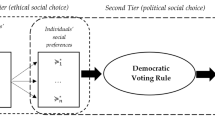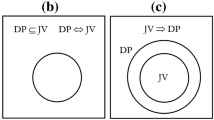Abstract
Democracy can be a means to independently valuable ends and/or it can be intrinsically (or non-instrumentally) valuable. One powerful non-instrumental defence of democracy is based on the idea that only it can publicly justify political authority. I contend that this is an argument about the reasonable acceptability of political authority and about the requirements of publicity and that satisfying these requirements has nothing to do with whether a society is democratic or not. Democracy, then, plays no role in publicly justifying political authority. I also show that any non-instrumental defence of democracy must make claims about what justice requires and make several further claims that require substantial justification.
Similar content being viewed by others
Notes
Perhaps through polling but unless its results bind decision-makers polling is compatible with dictatorship. Moreover, if polling is binding, all we have is a sub-section of the population voting; but this must be less democratic than if all citizens vote.
The claim is defeasible because there may be other important reasons for not giving those with superior political wisdom power, e.g., they may be morally bankrupt. I ignore this possibility in what follows.
For example, Estlund notes that denying any version of the cognitivist tenet is a ‘deep and exotic business’ (ibid., p. 74). For more general points about why denying the cognitivist tenet is more difficult than may seem to be the case see Estlund (1993, pp. 73–80), Copp (1993, pp. 103–106) and Estlund (2008, pp. 24–25).
This is an important point because if Estlund’s central claim is that the second-order epistemic tenet is satisfied only where there is agreement then it is an implausibly strong requirement: it will never be satisfied. Reasonable disagreement about justice is a permanent fact of modern life. See Copp (1993, pp. 107–110) for similar points about how to understand Estlund’s claims and on similar issues about reasonable disagreement more generally see Christiano (2000, pp. 522–525) in his review of Waldron’s arguments about democracy. See Waldron (1999).
This is why ‘we did not act upon your views because you are wrong’ counts not as a reason but as a failure of reason and an exercise in brute force. Reasonable citizens are owed the right kinds of reasons.
For example, referring to the past success of X is some kind of answer to B.
Such people would include oracles and those who are pathologically secretive.
‘p’ is to denote that this statement of P is provisional.
There are, though, two other important variables in Pp that must be defended, viz., the claims that only normal cognitive abilities and reasonable efforts are required. As defending these claims in the main body of this paper would detract from the primary focus of this section, I will make a few comments here. Christiano 2004 defends a ‘weak notion of publicity’ (pp. 270–271); it requires that, given reasonable efforts, the citizen of normal cognitive abilities and limitations, will see that ‘he or she is being treated justly’ (p. 270). I accept Christiano’s account for two reasons. First, it seems correct to require only that citizens need possess normal cognitive abilities. Citizens differ in abilities but as moral equals this should not affect their legitimate expectations about the public justification of political authority. Second, demanding only that citizens make ‘reasonable efforts’ seems appropriate. What it is to be reasonable is context-dependent. For example, while it is unreasonable for any doctor to keep a patient waiting for an hour while she decides which flu medication to prescribe, it is reasonable to take that amount of time if the illness is more serious and different medications have more or less severe side-effects. Therefore, stipulating that only reasonable efforts are required steers a middle way between demanding too much and too little of citizens.
There will be other implications, too, but this list will suffice for our purposes.
As the level of resources for comprehensive education would be the same but the number of pupils would be smaller.
Or, where some information, reason for a law, etc., is not publicly available for good reasons—such as the date on which a government will devalue its currency—the reasons for withholding that information must be available. For example, a legitimate rule could be that ‘any decision to de-value our currency will be kept secret until the decision is effective’. For more on this and similar issues see Luban (1996, pp. 188–192).
In fact in the absence of institutions like a free media the citizens may not even be able to judge this. They will find it difficult to know whether the democratically elected legislature implemented the minimum wage policy or whether some other elite has overridden the legislature and done it themselves.
This response was put to me by Julia Skorupska at the 2007 Warwick Graduate Conference in Political Theory and is similar to an argument advanced by Waldron (1999, Chap. 11). Here, I deal with the general ideas behind the response and not any of Waldron’s specific claims.
Although it may in fact be sufficiently broad to form the basis of an actual overlapping consensus. The likelihood of this will be determined by what conceptions of justice people do in fact hold which will probably be smaller than the total set of reasonable conceptions of justice and will include some unreasonable conceptions of justice as well. I doubt the acceptability of appealing to this sort of consensus, e.g., such a consensus may be unstable as any citizen could change their commitments and the consensus would then be destroyed, but I note that my argument does not rule out this sort of strategy.
Where non-opacity requires that any justification of why particular decision-makers have power must give reasons to show that the decision-makers are the best people to make decisions on issues of justice; and these reasons cannot invoke the fact that the decision-makers reliably make good decisions.
Where the requirements of publicity are satisfied, if and only if, any citizen of normal cognitive abilities who makes reasonable efforts understands the connections between the principles that animate the major institutions of her polity, and the specific policy implications that, given the facts, those principles require in any particular time-period.
References
Arneson, Richard. 1993. Democratic rights at national and workplace levels. In The idea of democracy, ed. David Copp, Jean Hampton, and John Roemer, 118–149. Cambridge: Cambridge University Press.
Arneson, Richard. 2003. Defending the purely instrumental account of democratic authority. Journal of Political Philosophy 11(1): 122–132.
Arneson, Richard. 2004. Democracy is not intrinsically just. In Justice and democracy, ed. Keith Dowding, Robert E. Goodin, and Carole Pateman, 40–59. Cambridge: Cambridge University Press.
Christiano, Thomas. 2000. Waldron on law and disagreement. Law and Philosophy 19(4): 513–543.
Christiano, Thomas. 2003. Is democracy merely a means to social justice? In Real libertarianism assessed, ed. Andrew Reeve, and Andrew Williams, 172–197. Basingstoke: Palgrave Macmillan.
Christiano, Thomas. 2004. The authority of democracy. Journal of Political Philosophy 12(3): 266–290.
Christiano, Thomas. 2006. Debate: Democracy’s authority: Reply to Wall. Journal of Political Philosophy 14(1): 101–110.
Cohen, Joshua. 2003. For a democratic society. In The Cambridge Companion to Rawls, ed. Samuel Freeman, 86–138. Cambridge: Cambridge University Press.
Copp, David. 1993. Could political truth be a hazard for democracy? In The idea of democracy, ed. David Copp, Jean Hampton, and John Roemer, 101–118. Cambridge: Cambridge University Press.
Estlund, David. 1993. Making truth safe for democracy. In The idea of democracy, ed. David Copp, Jean Hampton, and John Roemer, 71–101. Cambridge: Cambridge University Press.
Estlund, David. 2008. Democratic authority. Princeton, NJ: Princeton University Press.
Griffin, James. 2003. Democracy as a non-instrumentally just procedure. Journal of Political Philosophy 11(1): 111–121.
Laffer, Arthur B. 2004. The Laffer curve: Past, present, and future. The Heritage Foundation. http://www.heritage.org/Research/Taxes/bg1765.cfm. Accessed 30 July 2005.
Luban, David. 1996. The publicity principle. In The theory of institutional design, ed. Robert E. Goodin, 154–199. Cambridge: Cambridge University Press.
Rawls, John. 1997. The idea of public reason revisited. In Collected papers, ed. Samuel Freeman, 573–615. London: Harvard University Press.
Rawls, John. 1999. A theory of justice, Revised ed. Oxford: Oxford University Press.
Swift, Adam. 2003. How not to be a hypocrite: School choice for the morally perplexed parent. Falmer, London: Routledge.
Van Parjis, Philippe. 2003. Democracy: A mere instrument? In Real libertarianism assessed, ed. Andrew Reeve, and Andrew Williams, 212–214. Basingstoke: Palgrave Macmillan.
Waldron, Jeremy. 1999. Law and disagreement. Oxford: Oxford University Press.
Wall, Stephen. 2006. Debate: Democracy, authority and publicity. Journal of Political Philosophy 14(1): 85–100.
Williams, Bernard. 1985. Ethics and the limits of philosophy. Cambridge, MA: Harvard University Press.
Acknowledgments
I would like to thank Chris Bertram, Harry Brighouse, Benjamin Capps, Patrick Capps, and Adina Preda for comments on the many versions of this paper. I would also like to thank members of the Philosophy Department at the University of Wisconsin-Madison for making me welcome during my stay there during which much of this paper was written. Finally, I would like to thank several anonymous referees for their comments.
Author information
Authors and Affiliations
Corresponding author
Rights and permissions
About this article
Cite this article
Machin, D.J. The Irrelevance of Democracy to the Public Justification of Political Authority. Res Publica 15, 103–120 (2009). https://doi.org/10.1007/s11158-009-9084-4
Received:
Accepted:
Published:
Issue Date:
DOI: https://doi.org/10.1007/s11158-009-9084-4




